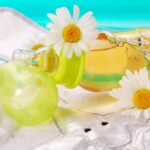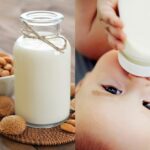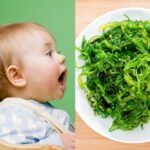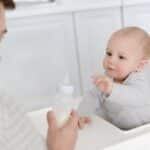What Happens If You Give A Pig A Pancake? is one of my favorite books to read my own kids when they were a baby.
It involves a pig who’ll do anything for a pancake. But when you give the pig a pancake, he’s going to want some maple syrup to go with it.
When I read this book to my own kids as babies, they’d often ask for pancakes afterward, which brought me to ask one of the questions that many parents of young babies ask at some point.
Is Maple Syrup Okay For Babies To Eat?
The reason that most parents tend to feel cautious around maple syrup when first starting to feed their babies is due to the panic around giving natural honey to babies under one-year-old.
Honey is contaminated with a bacteria called Clostridium Botulinum, otherwise known as botulism. If you’ve ever worked in the restaurant industry, you already know this to be your worst nightmare.
All the safety protocols around food production are based majorly on this type of food possible food poisoning. While honey contains the bacteria that can potentially make an infant under 12 months old sick with botulism, maple syrup does not.
Maple syrup is straight from the maple tree, processed through a boiler for many hours (which further removes bacterial contamination) and then served to you at the local grocery store.
Maple syrup is completely safe for infants that are of age to eat solid foods. It might not be the first food you introduce to your baby, but it certainly won’t hurt them if it is.
Another reason for caution would be the sugar content of maple syrup. It makes sense that it’s higher than that of breastmilk, and giving your baby a bunch of maple syrup first off might cause an unwanted blood sugar spike.
View in gallery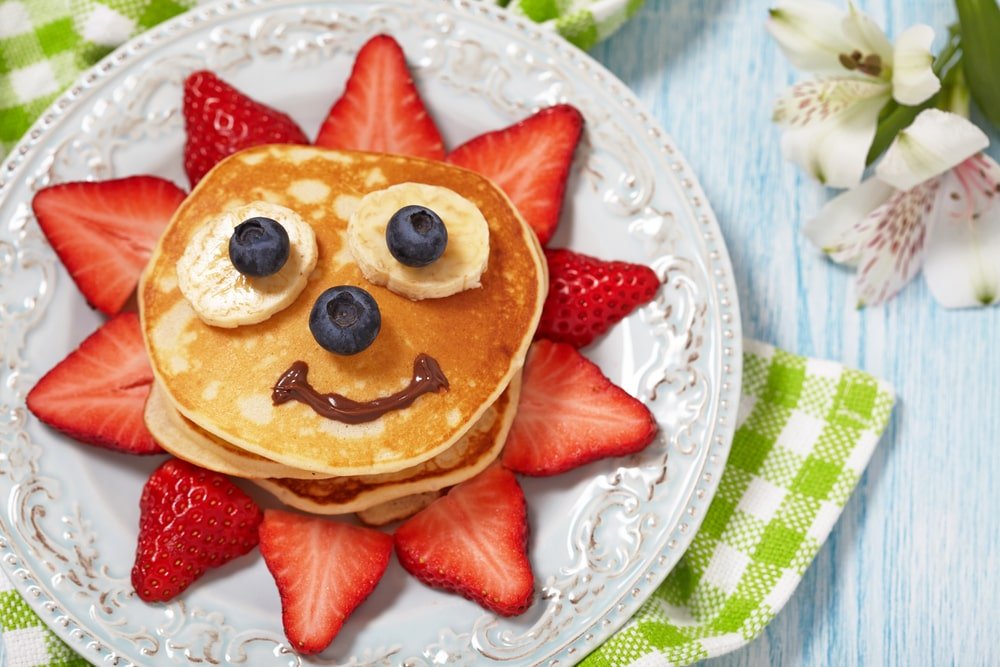
It’s best to introduce your baby to at least a few pureed veggies and fruits before giving straight maple syrup on a pancake or such.
This Question Is Quite A Controversial Topic
As mentioned above, a consequential reaction from the blood sugar spike is more likely in an infant than in a child who has been eating solid foods for a bit of time.
This is why some pediatricians will advise mothers to wait until at least 12 months of age to give babies honey, maple syrup, and even corn syrup.
This way they can develop a better balance of acids and digestive enzymes to counteract a possible upset tummy.
No parent wants to have a little baby with a woozy tummy or diarrhea, and have to guess and check why they are feeling so ill. Most parents of small babies will stress while they wait for a doctor’s appointment to figure out what has happened.
Some might even resort to an ER visit to make sure their 6-month-old is going to be okay, exposing them to possible other illnesses in the waiting room.
If your baby seems especially sensitive to foods already, it might be best to avoid maple syrup too until they get a bit more advanced with their diet.
Although my babies seemed to love it when I offered it on pancakes as one of their first ten food items they ever had. It was easy to make a few pancakes for them at lunch that they could play around with in their high-chair while learning to eat finger foods.
Where is Maple Syrup Derived From?
Maple syrup comes right from the maple tree usually located in Northeastern America and Canada. To qualify as pure maple syrup, it needs to be derived directly from the tree aka the sap of the tree.
Here in Portland Oregon, we walk along the Maple Tree Line trail at Forest Park that is filled with big leafed maple trees. I am almost certain we might find a way to forage it ourselves for our little ones.
How Is Syrup Graded?
Maple syrup grade is interesting but quite straightforward. You will come across dark versions of maple syrup and lighter versions – dark means it has a stronger flavor – lighter means lighter flavor.
Babies love thing’s that taste good and sweet, but it might be best to opt for a lighter maple syrup that is less concentrated the first time your baby has maple syrup.
View in gallery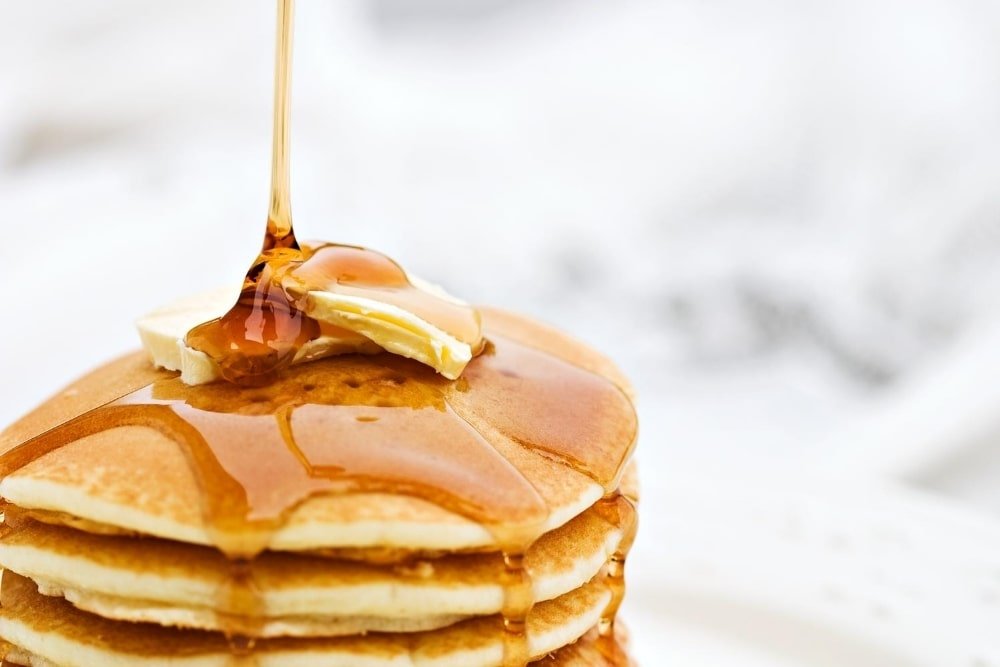
Grade A syrups can range in sweetness and delicacy. The lighter colored syrup is pulled earlier in the season and the darkest maple syrups are pulled later on giving it more time to enrich in the sunshine and warm weather.
- FLAVOR PROFILE: Our Grade A Amber Color Rich Taste syrup provides a naturally sweet, rich and smooth taste. A pronounced maple flavor makes Amber Rich maple syrup a favorite for table and all around use.
- SUSTAINABLY SOURCED: At Butternut Mountain Farm we are committed to giving you 100% pure Vermont maple syrup. The farmers with whom we work with understand maple and share our commitment to maintaining the health and sustainability of our forests.
- PACKAGING BENEFITS: Easy-open, easy-pour, jugs are tamper-evident with an inner seal. They ship well, so they make excellent gifts. Syrup stored in BPA-free plastic jugs retains its natural flavor better than in traditional tin containers.
Prices pulled from the Amazon Product Advertising API on:
Product prices and availability are accurate as of the date/time indicated and are subject to change. Any price and availability information displayed on [relevant Amazon Site(s), as applicable] at the time of purchase will apply to the purchase of this product.
Are There Health Risks If My Baby Accidentally Consumes Maple Syrup?
Again, the word of caution for infants under 12 months of age is due to the possible blood sugar spike. Babies are less likely to react adversely to high sugar foods when their pallet, gut flora, and digestive tract are well prepared for high sugar foods.
Thus, if your baby has a bit of maple syrup, say, cooked in with a dinner you made for the entire family the other foods will dilute the concentrated version of maple syrup that poses that threat.
You and your baby (as long as there are no known allergies to maple syrup) will be perfectly fine having a bit of maple syrup mixed in with the family dinner or their homemade baby foods.
You can’t go crazy trying to accommodate all the potential risks as a new parent, eating regularly and with the family is an important aspect to having a baby too.
Healthy Sugar Alternatives for Young Babies
Giving your child maple syrup before they hit 12 months of age is your choice ultimately, as a parent.
The good news is that there are plenty of alternative options to sweeten foods in your household. Sometimes applesauce is a bit tart, and babies take to it better if it’s lightly sweetened. To do this you can always use:
Sweeter Fruit
Strawberries and cherries are some of the sweetest fruits out there and are completely safe for babies under 12 months. No questions asked.
You can always heat up a bag of frozen fruits and toss in a tiny bit of organic cane sugar to make a tasty syrup for pancakes or use the juices sweeten up applesauce.
Stevia
If you have yet to try this amazing extract, then you’re in for a real treat. It’s completely sugar-free and sweeter than sugar itself. There are minerals and vitamins in it that end up being super great for the body.
- HIGHEST QUALITY stevia to ensure GREAT FLAVOR and NO AFTERTASTE
- ORGANIC STEVIA extract that is USDA Organic and Non-GMO Product Verified
- AWARD-WINNING stevia sweetener that has won 36 awards for taste and innovation
- CALORIE FREE way to sweeten water, yogurt, oatmeal, smoothies, coffee, and so much more
- KETO FRIENDLY
Prices pulled from the Amazon Product Advertising API on:
Product prices and availability are accurate as of the date/time indicated and are subject to change. Any price and availability information displayed on [relevant Amazon Site(s), as applicable] at the time of purchase will apply to the purchase of this product.
It’s truly a win-win with kids in the household.
Organic Agave
Agave ends up having a fairly high sugar content when it comes down to nutritional properties, but it’s derived from a ground plant and that means that it’s not maple syrup or honey posing the risk of infant botulism.
View in gallery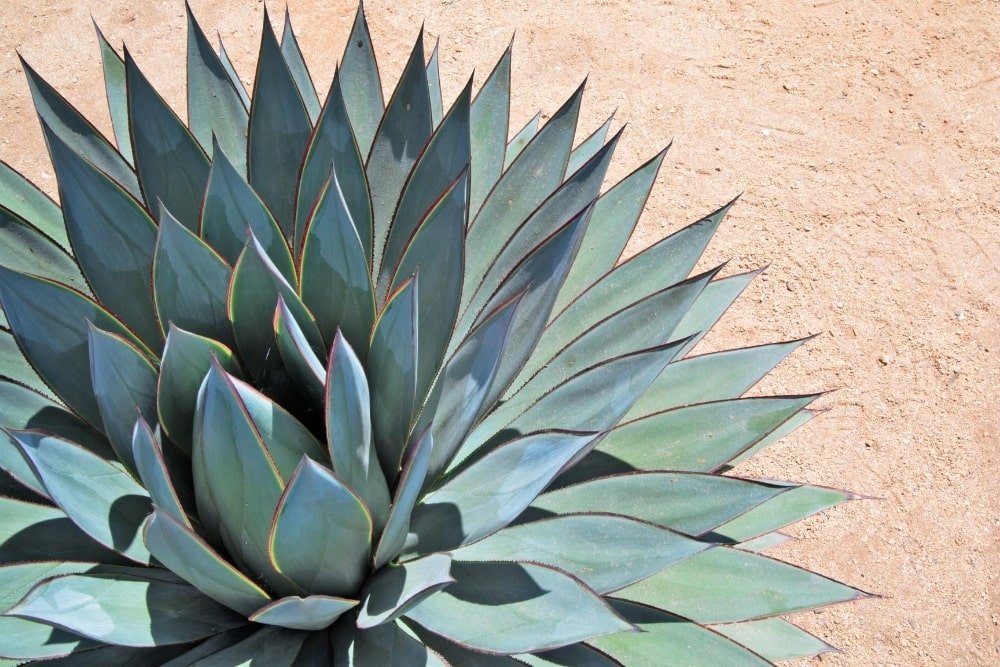
You can completely avoid the cautions that doctors give regarding what sweeteners infants can consume completely. It is basically a direct alternative to honey without the risk of infant botulism.
Brown Rice Syrup
The sweetener that most parents don’t know of yet or branch out and actively use for their children. And without good cause, this one should be more often considered, or at least spoken highly of in the parenting community.
It’s thicker than agave, less sweet than any of the alternatives on this, and the way it breaks down in the body is slowly. It gives babies body the chance to utilize it the proper way, not getting that rapid sugar spike that maple syrup and cane sugar give.
Syrup VS Honey
The difference of syrup compared to honey is where it comes from and how it is processed for consumers. Maple syrup comes straight from the maple tree, afterward it’s broken down by boiling it for hours which kills off plenty of potentially harmful bacteria.
On the other hand, honey is made from living bees who pollinate, roam around to flowers in soil, and don’t exactly store their honey “properly.”
This is why botulism can be found in honey – just like other forms of improperly stored foods in the household if they’re left out long enough for the bacteria to grow on the surface of the food.
Overall, syrup and honey are nutritionally similar in the aspect of what it contains like carbohydrates, minerals, vitamins, and contains a certain number of calories.
But, the amount and variation of these qualities greatly vary. Overall maple syrup is more nutritionally sound for kids than honey will ever be.
Buy Organic When Purchasing Maple Syrup for Young Kids
When you purchase honey, maple syrup, or any other form of sweetener for your child, the best way to do it is to buy an organic version of it.
This ensures that your baby is not exposed to certain pesticides, preservatives, and unnecessary protocols that manufacturers use when preparing these for consumers.
It also means that organic properties, that ultimately assist the body in breaking down organic versions of these foods are still present in the product when it reaches your child’s mouth.
View in gallery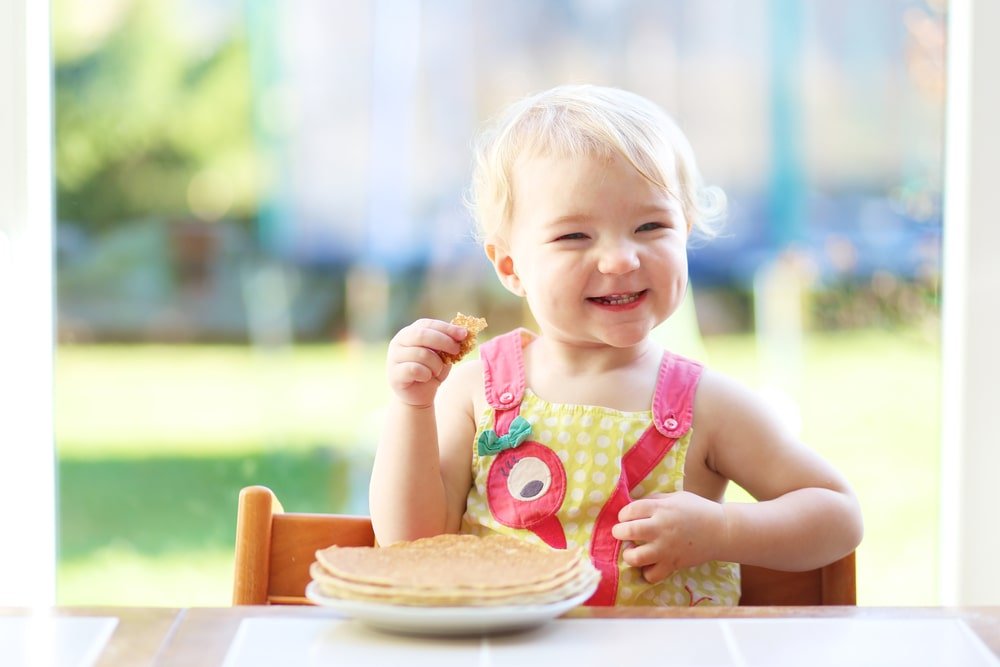
This is especially important for young babies when they are developing their gut bacteria, the acid content in their stomach, and digestive enzymes. It’s always best to go the most natural or organic route for foods that young babies will be consuming.
Conclusion
Yes, maple syrup is safe for babies under 12 months of age.
With that said, there are aspects to consider that you might care about personally or that your child’s digestive system might do better if you use alternatives to maple syrup in the first place.
The realm of caution regarding maple syrup consumption in infants includes: unnecessary blood sugar spikes in small babies, and turning them onto a super sweet product they might not want to consume certain foods without.
Doctors often advise against the usage of maple syrup due to the unnecessary blood sugar spike that infants don’t need in any way. But, it shouldn’t make babies who aren’t allergic to it react in any negative way.
Sources
Can baby have maple syrup? – Babycenter
5 Alternatives to Sugar Your Kids Will Love – EcoWatch

